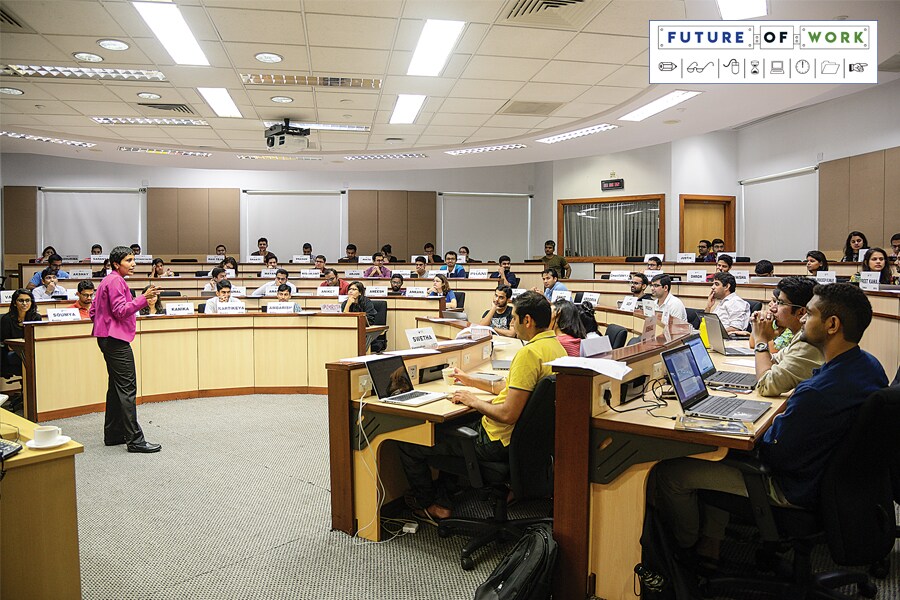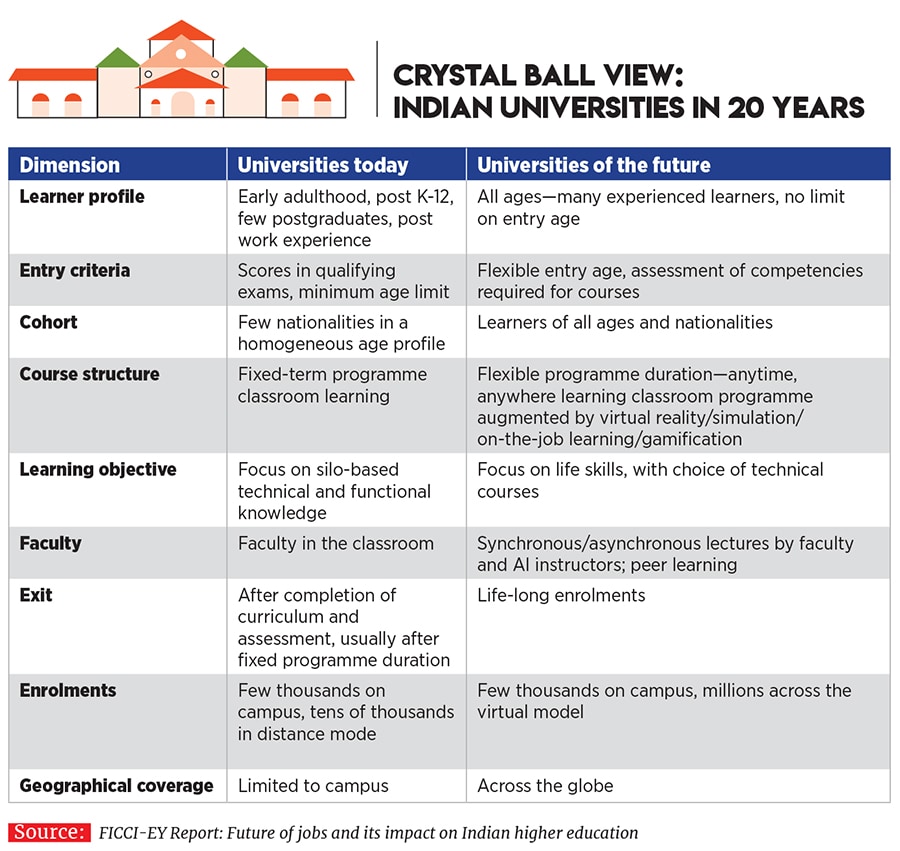Back to the blackboard
India's halls of ivy need a serious overhaul to prepare graduates for the future of work



For jobs that don’t exist today, graduates will need skills that are not being taught
Image: P Anil Kumar
First, the good news: The employability of Indian graduates is at an all-time high. But here’s the devil in the detail: That number stands at 45.6 percent, which means that over half of fresh graduates are not fit to be hired.
According to the India Skills Report 2018, conducted by talent assessment firm Wheebox and HR technology solutions company PeopleStrong, overall employability has increased to 45.6 percent from 34 percent over five years. The survey was carried out in association with the United Nations Development Programme (UNDP), Association of Indian Universities (AIU), Confederation of Indian Industries (CII) and the All India Council for Technical Education (AICTE) among others.
The report also shows concern for an important challenge up ahead—to ensure that graduates remain employable for the future of work. “The advent of the digital age and rapid technological disruption have ensured that the shelf life of skills is lower than it ever has been,” Amit Malik, chief people officer at Aviva Life Insurance, writes in the report. “Today, an engineering or MBA degree does not necessarily lead to a job, much less to a stable career. Skill development needs to start at the school level and education needs to be tailored to future needs. There is a need to act, and act fast, lest we lose our demographic advantage.”
A 2016 Ficci-Ernst & Young (EY) study titled ‘Future of jobs and its implication on Indian higher education’ predicts that 65 percent of the children who joined a primary school in 2016 will end up doing jobs that don’t exist today. “With the ever-changing job market and industry, it is imperative that the higher education system adapts itself to imparting life skills and analytical thinking processes among the learners—to prepare them for any job that they may take up in their working lives,” says Amit Sachdeva, partner, advisory services, EY.
“The free and anytime-anywhere availability of knowledge resources are challenging the role of higher education institutes as the sole creator and provider of knowledge—thereby necessitating the education system to make itself more open and flexible,” he adds.
The future of work involves a high degree of automation, artificial intelligence and large amounts of data analysis, in addition to an ability to work across multiple roles, geographies and office structures. “I see an increasing need for collaboration, multidisciplinary thinking, strategic decision making and creative problem-solving, at a scale we haven’t experienced before,” says Pramath Sinha, the provost of Anant National University and the founding dean of the Indian School of Business (ISB). “It is this future that we need to prepare our youth for.”
In the future, people are unlikely to hold on to a single job or a company for their entire career. “People won’t talk about jobs anymore, but livelihood. There will be a clear distinction between having a ‘job’ and ‘work’,” says Ajit Ranade, chief economist at the Aditya Birla Group. “As a result, like we’ve gone from the era of the single-channel Doordarshan to that of YouTube and Netflix, we’ll see thousands of degrees proliferate beyond the basic BA, BCom and BSc.”
The goal, then, is clear. But with more than half of India’s graduates struggling with basic employability skills, how do we get them ready for a future that requires so much more than just technical knowledge? Here’s a roadmap:
Think big
In the age of Google, students can easily find answers to domain-specific problems on their own. Thus far, intelligence has always been a function of memory, says Amit Kapoor, president and CEO of the Indian Council of Competitiveness. Instead, graduates will have to learn supreme analytical skills.
Instead of framing questions with phrases such as ‘define’ and ‘describe’, ask students to ‘analyse’, ‘interpret’ and ‘apply’, says Sandeep Sancheti, president of AIU. “You need to know how to contextualise your knowledge,” he says. “Otherwise you will gain a degree, but not an education that makes you steeled for the future.”
“It becomes important for us to focus on teaching them two things—how to learn, rather than what to learn and how to build a lifelong learning habit,” says Sinha of Anant National University. One approach to honing these skills, he says, is through design thinking. “Design thinking is a human-centric, systematic approach to problem-solving at its heart are empathy and creativity,” he adds. “It has widespread application across industry and can not only help graduates become future-ready, but also help them create innovative, sustainable solutions to the most pressing challenges.”
Break the borders
Students can no longer be fully equipped with single-stream knowledge. In a world where boundaries between domains are fast blurring, it’s important for education to become multi-disciplinary too. For instance, it’s rare to be able to study electronics with a focus on music, says Sancheti, yet, electronics is such an integral part of the music industry today.
“The government has to stop sanctioning standalone singular disciplinary institutes—we can’t have just engineering, management or social science institutes that operate in silos,” says Antara Sengupta, research fellow (education) at the Observer Research Foundation.
While private institutes do offer inter-disciplinary courses, they come at a price. “Not everyone can access them,” she adds.

Promote autonomy
Outdated syllabi has been widely considered as a factor in rendering graduates unemployable. The primary reason for this is the affiliated university system, in which hundreds of colleges are tied to a central university that decides their syllabus, exam structure, faculty appointments and so on. As with the University of Mumbai (MU), these bodies are often over-burdened and stretched thin for funds.
“MU has to cater to a student who comes from Palghar and Raigad, who may not have had access to the best education, and also students from the city. So their syllabus ends up becoming the lowest common denominator,” says Tushar Desai, principal, DG Ruparel College of Arts, Science and Commerce in Mumbai. “Academic autonomy is essential if you want to keep up with the times and prepare students for practical, industry-level learning, along with better placements.”
With autonomy, the institute has the option to take risks. “You can empower teachers with learning-outcome goals, instead of those that are always linked to marks,” says Errol D’Souza, director of IIM-Ahmedabad. “It can lead to a cultural shift in the way learning is perceived, where there has been a lot of inertia so far.”
Involve the Industry
Only a few colleges currently foster industry-academia partnerships. “It’s unclear what the industry gains out of sporadic associations and vice-versa,” says Devang Khakhar, director of IIT-Bombay. “If industry sees the linkage as a clear investment in manpower development, they can be incentivised to participate.”
With more industries opening up and their requirements becoming more specialised, there’s a need to align a slew of short-term courses that respond directly to their demands.
“Industry-sponsored programmes are co-created with a collaborating organisation to ensure that the students create value for the organisations,” says Sapnesh Lalla, CEO, NIIT. “Currently the industry is going through substantial uncertainty, partly due to digital transformations. The IT sector would like to move to a just-in-time hiring model.”
The fast-evolving business model calls for resources that can become productive from day one. As it may be a challenge for educational institutes to keep pace with the ever-changing business environment, we urgently need a finishing school to act as a bridge between industry and academia, he adds. “The finishing school should be in tune with changing requirements.”
Make learning lifelong
For jobs that don’t exist today, graduates will need skills that are currently not being taught. Students should embrace learning as a lifelong activity, and institutes can provide Massive Open Online Courses or other short-term courses to help them get there.
“We need to remove the stigma of re-entry into the education system,” says Ranade. “Both employers and institutes need to be flexible, to allow employees to take some time off for skill-based courses.”
In the future of work, the university system is likely to face the most heat. “So far, we’ve survived as organisations that give out degrees and diplomas,” says Sancheti. “Now, the degree has become irrelevant, as all the information you need for it is online. What matters, instead, is skill.”
First Published: Aug 06, 2018, 09:35
Subscribe Now